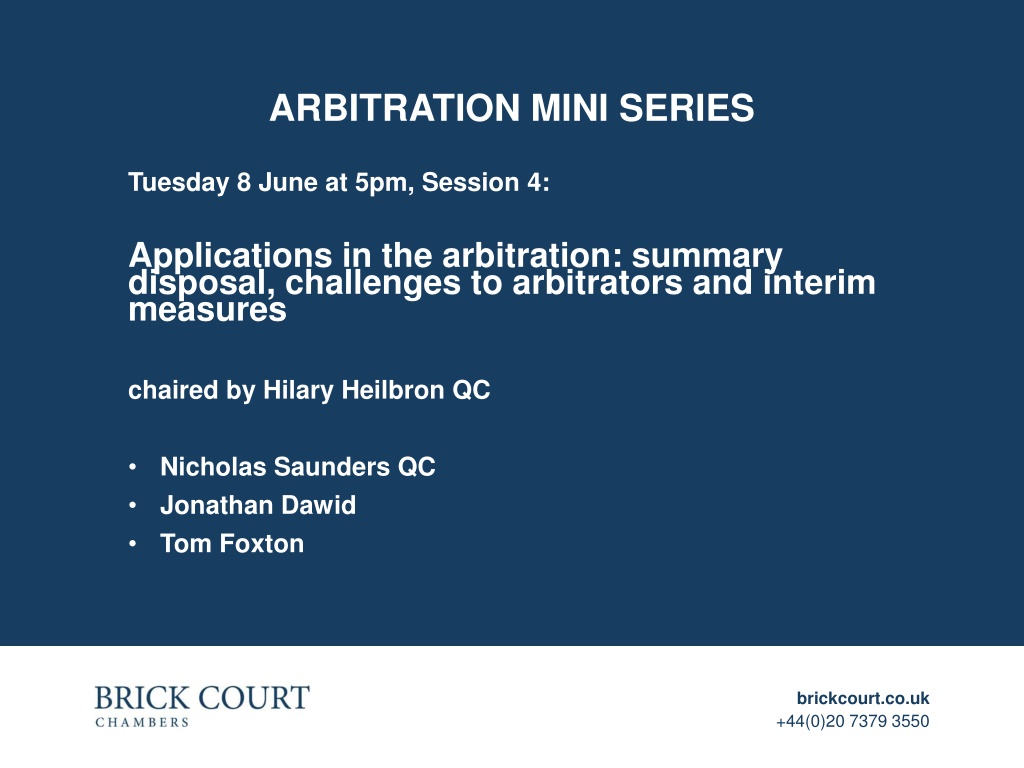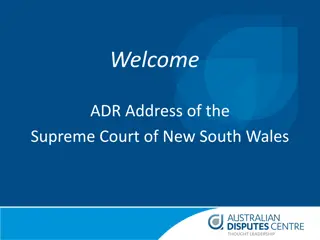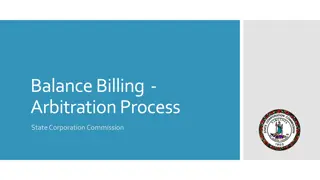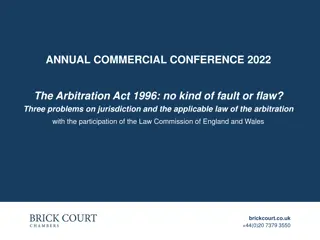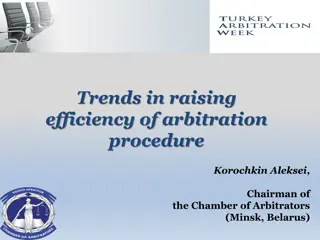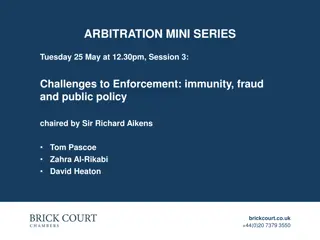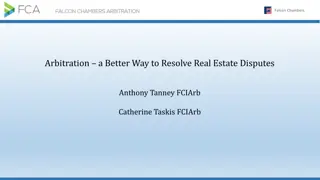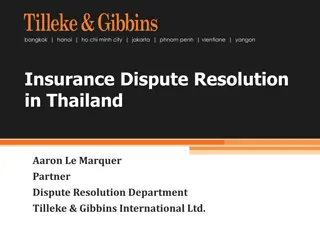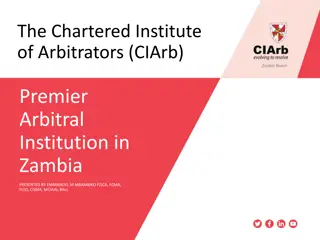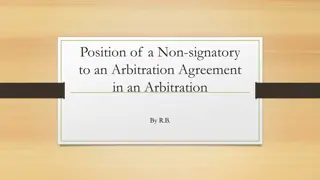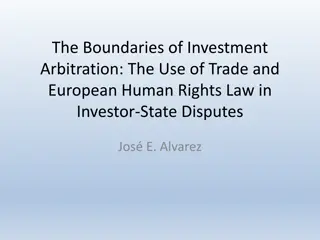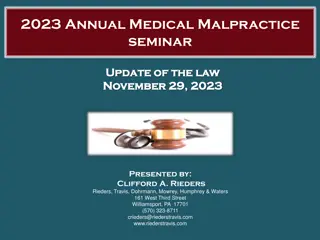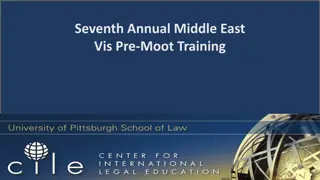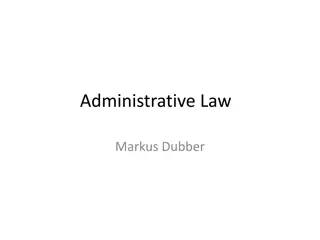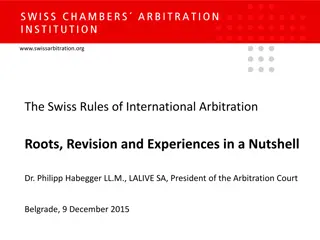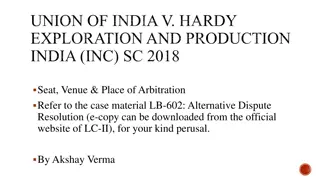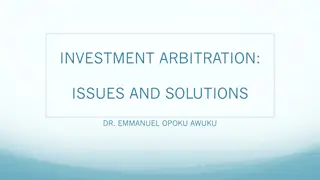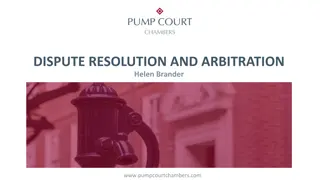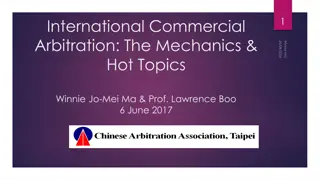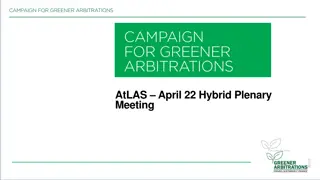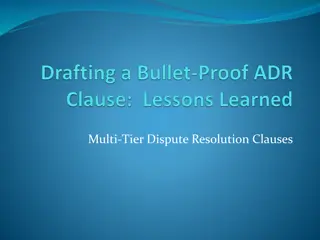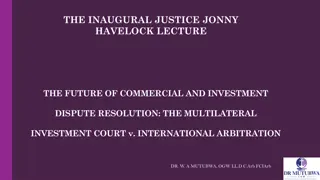ARBITRATION MINI SERIES
Complexities of summary disposition in international arbitration, covering its historical concerns, jurisdictional implications, and the latest developments in rules governing its application. Understand the significance of choosing arbitrators carefully and the implications for parties seeking expedited resolution through summary disposal.
Uploaded on Feb 22, 2025 | 0 Views
Download Presentation

Please find below an Image/Link to download the presentation.
The content on the website is provided AS IS for your information and personal use only. It may not be sold, licensed, or shared on other websites without obtaining consent from the author.If you encounter any issues during the download, it is possible that the publisher has removed the file from their server.
You are allowed to download the files provided on this website for personal or commercial use, subject to the condition that they are used lawfully. All files are the property of their respective owners.
The content on the website is provided AS IS for your information and personal use only. It may not be sold, licensed, or shared on other websites without obtaining consent from the author.
E N D
Presentation Transcript
ARBITRATION MINI SERIES Tuesday 8 June at 5pm, Session 4: Applications in the arbitration: summary disposal, challenges to arbitrators and interim measures chaired by Hilary Heilbron QC Nicholas Saunders QC Jonathan Dawid Tom Foxton brickcourt.co.uk +44(0)20 7379 3550
SUMMARY DISPOSITION IN INTERNATIONAL ARBITRATION Nicholas Saunders QC brickcourt.co.uk +44(0)20 7379 3550
WHEN MIGHT YOU WANT IT? How rare is it? Historically some concerns about summary disposition on 3 grounds: Absence of provisions historically in most leading arbitration rules; Concerns about due process and enforceability of awards Cultural prejudices in international arbitration Just limited to jurisdictional issues? Points of contractual construction particularly attractive to former members of the English judiciary. Choose your arbitrators carefully! Some parties cite the importance of summary disposition as a reason they would prefer to use the court system e.g. in financial services brickcourt.co.uk +44(0)20 7379 3550
IS IT AVAILABLE? THE DILEMMA Is there jurisdiction: Example of LCIA Rules 2014 rule 14.5 general power. Cf arbitration act 1988 s.33: [power to] adopt procedures suitable to the circumstances of the particular case, avoiding unnecessary delay or expense, so as to provide a fair means for the resolution of the matters falling to be determined But party autonomy arguments against parties freedom to agree about the arbitral procedure. Implied choice not to agree a set of rules which provide for summary disposition. Especially acute concern given limitation on appeal on decisions on the merits. brickcourt.co.uk +44(0)20 7379 3550
NEWER RULES PROVIDE EXPRESS POWER New LCIA Rules: Revised Article 22.1 - a Tribunal has the power under Article 14 to decide the stage of the arbitration at which any issue or issues shall be determined (Art. 22.1(vii)) and to determine that any claim . . . is . . . manifestly without merit; and where appropriate to issue an order or award to that effect (an Early Determination ) (Art. 22.1(viii)). See also newer SIAC Rules (2016), SCC Rules (2017), LCIA Rules (2020) and so on. brickcourt.co.uk +44(0)20 7379 3550
WHAT IS THE TEST? Part 24 of the CPR ? The court may give summary judgment against a claimant or defendant on the whole of a claim or on a particular issue if (a) it considers that (i) that claimant has no real prospect of succeeding on the claim or issue; or (ii) that defendant has no real prospect of successfully defending the claim or issue; and (b) there is no other compelling reason why the case or issue should be disposed of at a trial. See also Easyair v Opal Telecom Ltd [2009] EWHC 339 etc But: no real appeals, due process etc. brickcourt.co.uk +44(0)20 7379 3550
WHAT IS THE TEST? (2) ICSID Arbitration Rule 41(5) : Unless the parties have agreed to another expedited procedure for making preliminary objections, a party may, no later than 30 days after the constitution of the Tribunal, and in any event before the first session of the Tribunal, file an objection that a claim is manifestly without legal merit. The party shall specify as precisely as possible the basis for the objection. The Tribunal, after giving the parties the opportunity to present their observations on the objection, shall, at its first session or promptly thereafter, notify the parties of its decision on the objection. The decision of the Tribunal shall be without prejudice to the right of a party to file an objection pursuant to paragraph (1) or to object, in the course of the proceeding, that a claim lacks legal merit. brickcourt.co.uk +44(0)20 7379 3550
ICSID CASE LAW ICSID case law can be either objection as to jurisdiction or the merits: In Trans-Global v. Jordan, the ICSID Tribunal found that manifestly should be interpreted by its ordinary meaning, palpable , clearly revealed to the eye, mind or judgment , open to view or comprehension or obvious , and that it requires the respondent to established its objection [under Rule 41(5)] clearly and obviously, with relative ease and despatch. The standard is thus set high ICSID Case No Arb/07/25 The Tribunal further noted that summary disposition is not a fact finding mission, and that [i]t would be a grave injustice if a claimant was wrongly driven from the judgment seat by a final award under Article 41(5), with no opportunity to develop and present its case under the written and oral procedures described in the remainder of the ICSID Arbitration Rules brickcourt.co.uk +44(0)20 7379 3550
ICC PRACTICE NOTE 2017 Article 22 The arbitral tribunal and the parties shall make every effort to conduct the arbitration in an expeditious and cost-effective manner, having regard to the complexity and value of the dispute. Practice Note of 30 October 2017 summary disposition part of the tools available to the tribunal under Art 22: enables expeditious determination of manifestly unmeritorious claims or defences brickcourt.co.uk +44(0)20 7379 3550
HOW (NOT) TO CHALLENGE AN ARBITRATOR Jonathan Dawid brickcourt.co.uk +44(0)20 7379 3550
VENUE FOR CHALLENGE Section 24 Arbitration Act 1996: can apply to Court for removal of arbitrator on grounds including that circumstances exist that give rise to justifiable doubts as to his impartiality and refusal or failure properly to conduct the proceedings . BUT - Section 24(2): If there is an arbitral or other institution or person vested by the parties with power to remove an arbitrator, the court shall not exercise its power of removal unless satisfied that the applicant has first exhausted any available recourse to that institution or person. ICC (2021) Article 14 / UNCITRAL (2010) Articles 12-13 / LCIA (2020) Article 10 Alternative approach: challenge award under Section 68 brickcourt.co.uk +44(0)20 7379 3550
TIMING OF CHALLENGE Challenge must usually be made within set period of becoming aware of facts and circumstances on which it is based. oICC: 30 days oUNCITRAL: 15 + 30 days oLCIA: 14 days When does time start to run? Suspensive effect? brickcourt.co.uk +44(0)20 7379 3550
GROUNDS FOR CHALLENGE ICC, Article 14(1): A challenge of an arbitrator, whether for an alleged lack of impartiality or independence, or otherwise, shall be made by the submission to the Secretariat of a written statement specifying the facts and circumstances on which the challenge is based. UNCITRAL, Article 12(1): Any arbitrator may be challenged if circumstances exist that give rise to justifiable doubts as to the arbitrator s impartiality or independence. LCIA, Article 10(1)-(2): circumstances exist that give rise to justifiable doubts as to that arbitrator s impartiality or independence / does not act fairly or impartially as between the parties brickcourt.co.uk +44(0)20 7379 3550
CONSEQUENCES OF SUCCESSFUL CHALLENGE Replacement of arbitrator All rules provide for arbitrator to be replaced on successful challenge Exception: ICC Article 15.5 (arbitrator removed after proceedings closed) Rerun of proceedings? ICC Article 15.4 / LCIA Article 11.3: Up to (new) tribunal to determine to what extent prior steps stand. UNCITRAL Art 15: similar but presumption of continuity. brickcourt.co.uk +44(0)20 7379 3550
INTERIM MEASURES: SECURITY FOR COSTS AND SECURITY FOR CLAIM Tom Foxton brickcourt.co.uk +44(0)20 7379 3550
INTRODUCTION Interim measures awarded by the Tribunal have fewer teeth than their court-ordered counterparts. But institutional rules and supervising courts will often require a party seeking an interim measure to apply to the Tribunal in the first instance. Rule 25.3 of the 2020 LCIA Rules, only permits a party to apply to a national court for an interim measure where (i) the Tribunal has not yet been formed; or (ii) otherwise in exceptional cases and with the Tribunal s authorisation. Rule 25.4 prohibits a party from applying to a national court for an order for security for costs. The English courts will decline to grant urgent relief under section 44(3) of the Arbitration Act 1996 if timely and effective relief can be obtained from the Tribunal (section 44(5)), including from an expedited tribunal or emergency arbitrator: Gerald Metals SA v Timis [2016] EWHC 2327 (Ch). brickcourt.co.uk +44(0)20 7379 3550
SECURITY FOR COSTS: SOURCE OF THE POWER (a) Default (non-mandatory) provisions of the curial law Arbitration Act 1996 38 General powers exercisable by the tribunal. (1) The parties are free to agree on the powers exercisable by the arbitral tribunal for the purposes of and in relation to the proceedings. (2) Unless otherwise agreed by the parties the tribunal has the following powers. (3) The tribunal may order a claimant to provide security for the costs of the arbitration. This power shall not be exercised on the ground that the claimant is (a) an individual ordinarily resident outside the United Kingdom, or (b) a corporation or association incorporated or formed under the law of a country outside the United Kingdom, or whose central management and control is exercised outside the United Kingdom. [ ] brickcourt.co.uk +44(0)20 7379 3550
SECURITY FOR COSTS: SOURCE OF THE POWER (b) Institutional rules Rules Power Article 25.2 Specific power to award security for costs LCIA Rules 2020 ICC Rules 2021 Article 28(1) General power to award conservatory and interim measures Rule 27(j) Specific power to award security for costs SIAC Rules 2016 HKIAC Rules 2018 Article 23 General power to award interim measures of protection and emergency relief ICSID Article 47 of the ICSID Convention + Rule 39 of the ICSID Rules 2006 give a general power to award provisional measures Article 26 General power to award interim measures UNCITRAL brickcourt.co.uk +44(0)20 7379 3550
SECURITY FOR COSTS: APPLICABLE PRINCIPLES (a) Starting point: general reluctance J Lew, L Mistelis and S M Kroll, Comparative International Commercial Arbitration (Kluwer 2003), pages 601-602: There are few cases where arbitrators have ordered security for costs. This may be an indication that tribunals are reluctant to exercise this power. One reason is the strong view that orders for security for costs are not appropriate in arbitration. There are good arguments that a higher standard should be applied than in court proceedings. Arbitration generally requires that the respondent agreed to arbitrate with the claimant. Furthermore the burden placed on the claimant by the obligation to pay an advance on costs under the institutional rules or to the arbitrators in respect of their fees is considered to be a sufficient safeguard to exclude any abusive and extravagant claims. Since the lack of sufficient funds is often due to the actions or contractual non- performance of the respondent it is feared that in those cases parties may abuse requests for additional security to prevent underfunded claimants from pursuing their rights. brickcourt.co.uk +44(0)20 7379 3550
SECURITY FOR COSTS: APPLICABLE PRINCIPLES (b) CIArb Practice Guideline on Applications for Security for Costs (2016) Article 1 General principles 1. The General principles stated in Article 1 of the Guideline on Applications for Interim Measures are equally applicable to applications for security for costs. 2. When deciding whether to make an order for security for costs, arbitrators should take into account the following matters: i) the prospects of success of the claim(s) and defence(s) (Article 2); ii) the claimant s ability to satisfy an adverse costs award and the availability of the claimant s assets for enforcement of an adverse costs award (Article 3); and iii) whether it is fair in all of the circumstances to require one party to provide security for the other party s costs (Article 4). 3. This list is not exhaustive and arbitrators should also take into account any other additional considerations they may consider relevant to the particular situation of the parties and the circumstances of the arbitration. brickcourt.co.uk +44(0)20 7379 3550
MATERIAL CHANGE IN CIRCUMSTANCES Paragraphs (b) and (c) of the Commentary on Article 3 of CIArb Practice Guideline on Applications for Security for Costs (2016) Insolvency and accepted business risk b) [ ] if the solvency of a party was questionable at the inception of the relationship between the parties, arbitrators may consider that the inability to pay is no reason to order security as such a risk was a consequential effect of doing business with that party. [ ] Even if a party s ability to pay has deteriorated since the inception of the relationship, the arbitrators may consider that this was a normal commercial risk known at the inception of the relationship. c) If, however, the circumstances show that the deterioration of the party s financial situation or the lack of available assets was caused by something other than an accepted business risk, arbitrators may consider that an order for security for costs is justified. [ ] Cf. XXX INC., incorpor e dans une le des Cara bes v. YYY S.A., incorpor e dans un pays d'Am rique latine, (ICC Case No. 15951/FM), Procedural Order No. 2 (29 May 2009), 28 ASA Bulletin (2010, Issue 1) page 75. brickcourt.co.uk +44(0)20 7379 3550
THIRD PARTY FUNDING Report of the ICCA-Queen Mary Task Force on Third-Party Funding in International Arbitration (April 2018) The ICCA Reports No. 4, page 190 Principles on Security for Costs: D.1. An application for security for costs should, in the first instance, be determined on the basis of the applicable test, without regard to the existence of any funding arrangement. D.2. The terms of any funding arrangement, including ATE, may be relevant if relied upon to establish that the claimant (or counterclaimant) can meet any adverse costs award (including, in particular, the funder's termination rights). D.2. In the event that security turns out not to have been necessary, the tribunal may hold the requesting party liable for the reasonable costs of posting such security. brickcourt.co.uk +44(0)20 7379 3550
INVESTMENT ARBITRATION Conflicting decisions about whether there is a right to security for costs in ICSID Arbitration: Emilio Agust n Maffezini v.Kingdom of Spain, (ICSID Case No. ARB/97/7) Procedural Order No. 2 (28 October 1999) para. 15; Rachel S. Grynberg, Stephen M. Grynberg, Miriam Z. Grynberg and RSM Production Company v. Grenada, (ICSID Case No. ARB/10/6), Tribunal s Decision on Respondent s Application for Security for Costs (14 October 2010), para. 5.16, in fn. 9 (dissenting arbitrator); Eskosol S.P.A. in Liquidazione v. Italian Republic, (ICSID Case No. ARB/15/50) Procedural Order No. 3 (Decision on Respondent s Request for Provisional Measures), (12 June 2017) para. 35. Tribunals in investment arbitration tend to apply a stricter standard in applications for security for costs, sometimes requiring evidence of abusive conduct or bad faith on the part of the claimant: South American Silver Limited v. The Plurinational State of Bolivia, (PCA Case No.2013-15), Procedural Order No. 10 (11 January 2016), para. 59; RSM Production Corporation v. Saint Lucia, (ICSID Case No. ARB/12/10), Decision on Saint Lucia s Request for Security for Costs (13 August 2014), para.75. brickcourt.co.uk +44(0)20 7379 3550
SECURITY FOR CLAIM Default (non-mandatory) provisions of the curial law No specific default provision in the English Arbitration Act 1996. Cf. sections 12(1)(g)-(h) of the Singapore International Arbitration Act, which give the Tribunal specific powers to secure the amount in dispute and prevent the dissipation of assets. Institutional rules Rules Security for claim Article 25.1 Specific power to order the preservations of monies Article 28(1) General power to order conservatory and interim measures Rule 27(k) Specific power to order security for claim Article 23 General power to order interim measures of protection and emergency relief Article 47 of the ICSID Convention + Rule 39 of the ICSID Rules 2006 give a general power to award provisional measures Article 26 General power to award interim measures LCIA Rules 2020 ICC Rules 2021 SIAC Rules 2016 HKIAC Rules 2018 ICSID UNCITRAL brickcourt.co.uk +44(0)20 7379 3550
PRACTICAL POINTS Demonstrating the opposing party s inability to satisfy an adverse costs award/final award. Evidence of financial records; history of non-compliance; opaque corporate structure. Holding the security. Payment into escrow (ICC Case No 7536, 11(1) ICC Ct. Bull. 23 (2000)), the provision of a bank guarantee, or the sequestration of the property in dispute: ICC Case No 9154, 11(1) ICC Bull. 98 (2000). Some arbitral institutions (including the LCIA and HKIAC) offer a fund-holding service. Emergency arbitrator/expedited tribunal. See LCIA Rules 2020, Articles 9A and 9B; ICC Rules 2021, Article 29 and Appendix V; SIAC Rules 2016, Rules 5, 26 and Schedule 1; HKIAC Rules 2018, Schedule 4. If the party fails to comply with the Tribunal s order: Apply for a court order under section 42 of the Arbitration Act 1996 to enforce the peremptory order of the Tribunal. Cross-indemnity: Seek a cross-indemnity from the party asking for security: LCIA Rules 2020, Articles 25.1 and 25.2; Principle D.3. of the ICCA-Queen Mary Task Force on Third-Party Funding in International Arbitration s Principles on Security for Costs. brickcourt.co.uk +44(0)20 7379 3550
ARBITRATION MINI SERIES Tuesday 8 June at 5pm, Session 4: Applications in the arbitration: summary disposal, challenges to arbitrators and interim measures chaired by Hilary Heilbron QC Nicholas Saunders QC Jonathan Dawid Tom Foxton brickcourt.co.uk +44(0)20 7379 3550
